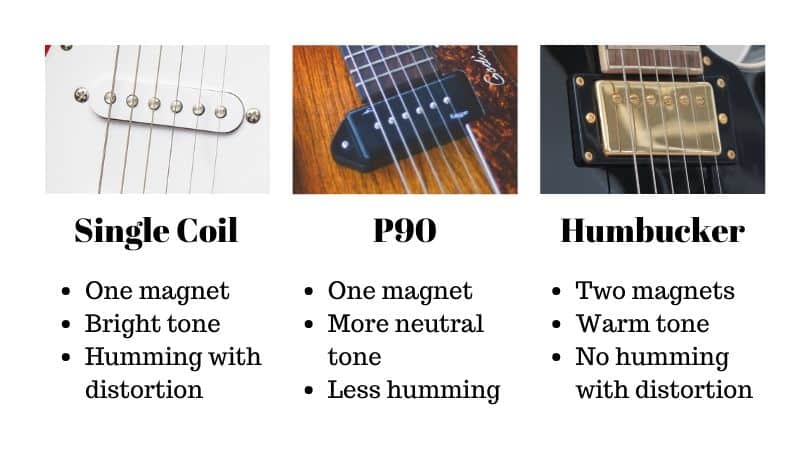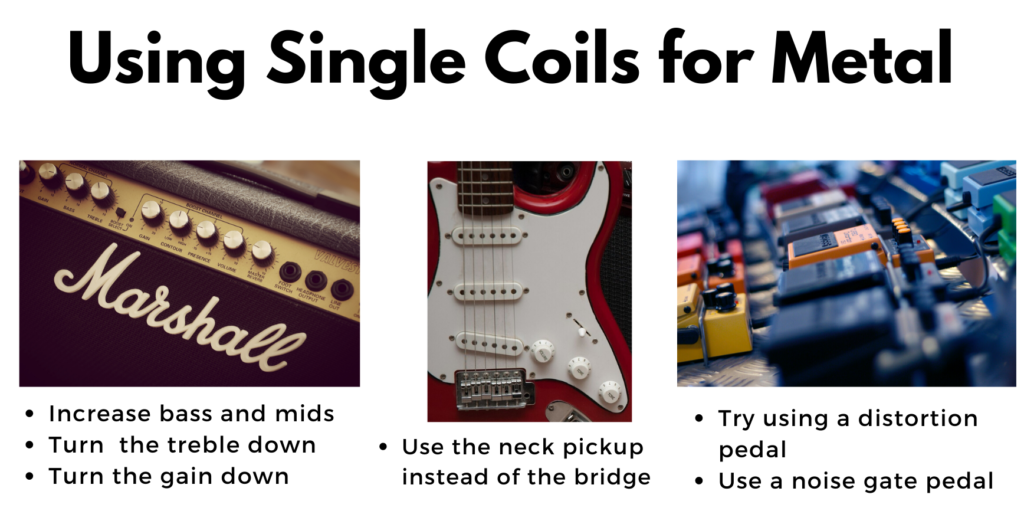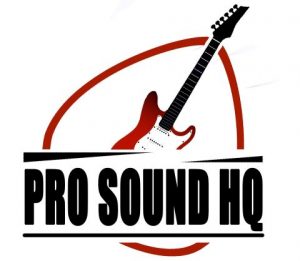Everyone knows that the pickups you have in your electric guitar is one of the biggest factors in determining your tone. Some pickups sound thick and dark, like humbuckers. And others sound much brighter and twangier, like single coils.
The Quick Answer
Single coil pickups are not commonly used for metal, but it is still possible to do so. To use single coils for metal, use the neck pickup and adjust the EQ of your amp to lower the treble, and increase the bass. It can also be worth investing in a noise-gate pedal or distortion pedal.
Why are Single Coils Rarely Used for Metal?
- Single coil pickups have a weak bass response.
- The humming background noise issue you get when you crank up the gain.
- Single coil pickups are usually passive not active.
- Single coils sound too bright and twangy.
single coils have a Weak bass response
Firstly, single coils have a weaker bass response than other pickup types like P90’s and humbuckers. In metal, the electric guitars tend to have a higher bass setting than most genres of music. This is what helps you get a thick wall of sound.
Instead, single coils placed more emphasis on the treble frequencies. This gives them a brighter tone, but makes them sound thinner.
single coils produce a Humming noise with high gain
Single coils are passive pickups
Single coils sound too bright and twangy
Are Humbuckers Better than Single Coils for Metal?
Usually, if you’re looking to play metal on your electric guitar, then you’ll want to choose humbucker pickups over single coils. These produce the darkest, fullest and best quality tone when using a distorted amplifier or pedal.
With humbuckers, you don’t get the humming issue that P90 and single coil pickups suffer from. This is because humbuckers have two coils. These are arranged in opposite directions, which cancels out this humming sound. Hence, they sound better when you use a lot of gain, compared to a single coil pickup design.
You’ll also find a lot more active humbucker pickups, than single coils or P90’s. This allows you to get a high output, powerful sound, but without sacrificing the clarity of the tone.
The darker and fuller tone of the pickups makes them better alternatives for metal than single coils. In comparison, single coil pickups sound much thinner and weaker, which really isn’t what you want for metal.
This is because humbuckers place more emphasis on the bass, and mid-range frequencies, whereas single coil pickups place more emphasis on the treble frequencies.
Take a look at this pickup comparison guide that I’ve put together to learn more about the differences between single coils, humbuckers and P90 pickups.

How to Use Single Coils for Metal
So what if your guitar only has single coil pickups, and you still want to be able to play metal style music on it? Is there anything that can be done to help?
There are actually several ways which will help your pickups sound better, if you want to use single coils to play metal. Here are some things you can try.

use the middle or neck pickup
- Bridge pickups sound brighter and sharper, as they place more emphasis on the treble frequencies, rather than the bass.
- Neck pickups sound warmer and more mellow because they place more emphasis on the bass frequencies, rather than the treble.
In order to counter act the already bright and sharp tone of your single coil pickups, you want to use the neck or middle pickup, to warm things up a bit.
Sometimes the neck pickup can sound too mellow, so often the middle pickup is your best bet, of course, if your guitar has three pickups.
Check out this post I’ve written explaining the difference between bridge and neck pickups for some more info.
increase the bass and mids on your amp
Since single coils have a weak bass and mid-range response, one of the best things you can do, is turn the bass setting up on your amplifier. This will help give you a bit of a boost in the bass department, where the single coils are holding you back.
You don’t want it too high, or it’ll sound too “boomy”, but try turning it up a touch until you find the sweet spot.
I know that not all amplifiers have a bass control though, some have “tone” or “EQ” controls. You’ll need to adjust this to place more emphasis on the bass, rather than the treble. This usually means adjusting them downwards.
Take a look at this post I’ve written on guitar amp settings and controls to find out how to properly set up your amplifier.
Decrease the Treble on your Amp
To counter act the sharpness and crispness of your single coils, you can turn the treble control down on your amplifier. This will help remove some of the emphasis on the high-end frequencies that can cause your tone to be too harsh and sharp for metal.
Be careful not to turn it too far down though, or you’ll lose all the clarity and note separations. So again, keep adjusting down until you find the sweet spot.
If your amp has an EQ or Tone control, instead of individual bass, mids and treble controls, then you’ll most likely need to adjust this downwards to achieve the same affect as you would if you knocked the treble back a bit.
decrease the gain on your amp
This might sound counter-intuitive, but in most cases, you’ll want to have a lower gain setting than you first might think. Let me explain.
When you increase the gain on your amp, two negative things will happen. One, you’ll lose some clarity and note separation. And two, you’ll increase the background humming noise of the single coil pickups.
Although metal is supposed to have high gain amp settings, you don’t want these two problems to wreck your tone.
So only turn your gain setting up as much as you need to, to get this metal-style tone, and don’t turn it up any higher.
If you feel like your losing the depth to your tone when you turn down the gain, then consider increasing your mids and bass control further to thicken out your tone a bit. Or, try the next step.
Use a distortion pedal
If you’re really struggling to get a high quality distorted tone through your amplifier, then try using a distortion pedal instead.
A distortion pedal will give you a better quality source of gain, that you can control more easily, and to higher precision. When using a distortion pedal, you’ll suffer less from a lack of clarity, and also a lack of depth and thickness to your tone.
If you want an overdrive and distortion pedal all-in-one, then check out the Boss OS-2 Distortion/Overdrive Pedal. It’s what I currently use because it stops my pedal board getting cluttered, and it’s really versatile and gives you tonnes of high quality gain on tap.
If you’re just after pure distortion, then you may want to look at something a bit heavier like the Boss DS-1 Distortion Pedal.
add a noise gate
Another pedal that you can add to your rig, that you’ll really benefit from if you’re using single coil pickups for metal, is a noise gate pedal.
Noise gate pedals are super useful. Essentially, their function is to remove any unwanted noise or buzzing from your amplifier. This includes the annoying humming you get if you crank up the gain when using single coils.
Using a noise gate pedal, will allow you to increase the gain, to get that real thick metal tone, but without the extra unwanted noise you often find with single coil pickups.
Guitar Center are always the first place I look at when I’m interested in a new electric guitar because have a huge range of models for sale and always have some excellent deals on. Here’s a link to take you directly to Guitar Center’s electric guitar range so you can see all the offers available at the moment.
Best Single Coil Pickups for Metal
If you’re looking for some single coil pickups that will help you achieve a better metal tone, then check out these options below.
DiMarzio DP422
These pickups are well known for sounding warmer and louder than traditional single coils. Although they don’t sound like humbuckers, they are about as close as you can get with a single coil pickup. It also has hum-cancelling, which allows you to increase the gain, without annoying feedback and background noise. Check out these DiMarzio DP422 pickups on Guitar Center.
EMG SA
EMG are specialists in designing pickups that are best suited for producing powerful sounds for metal music. These pickups are some of the only active single coils out there. This means you’ll get a boosted mid-range, plus a higher output so an increase in sustain. Check out the EMG SA pickups on Guitar Center.
So there you go! That’s how to use single coil pickups for metal! I hope you’ve found this article helpful, thanks for reading. Here are some other posts you might find useful:
